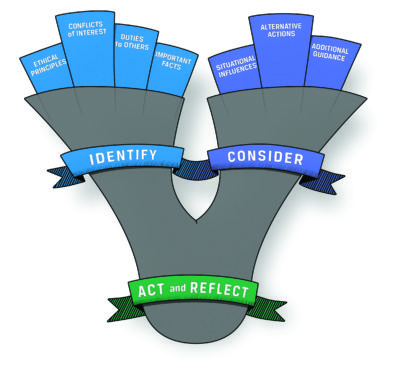Ethics in Practice: Political Contributions. Case and Analysis–Week of 26 November
Check out the analysis for this week’s case (26 November) to see how you did with your own analysis.
Case
Myers is a founder of and partner at Redbrick, a $3 billion hedge fund focused on environmental, social, and governance investments. In support of upcoming state elections, he donated $2,000 to DeFrietas, one of the candidates. As a passionate climate advocate and an avid proponent of responsible investment, Myers supported DeFrietas’ backing of environmental policies to reduce air pollution and mitigate the effects of climate change. Myers also thought that his political contribution might be beneficial for Redbrick because DeFrietas was running for a position that had influence over which hedge funds received investments from the state’s pension plans. Myers informed all Redbrick limited partners (LPs) about the contribution and clarified that he had used personal rather than company funds for the political contribution. Myers’ actions are
- appropriate because he provided full disclosure about his political contribution to his clients.
- appropriate because he used personal funds and the amount of his donation is insignificant relative to the size of the fund.
- appropriate because his donation supports a candidate whose environmental policies align with his beliefs.
- inappropriate because making donations to try to win investments from the state pension fund violates the CFA Institute Code of Ethics and Standards of Professional Conduct.
Analysis
This case relates to CFA Institute Standard I(B): Independence and Objectivity, which states that CFA Institute members must not offer any gift, benefit, compensation, or consideration that reasonably could be expected to compromise another’s independence and objectivity. Managers may try to gain lucrative allocations from government-sponsored pension funds by making requested donations to the political campaigns of individuals directly responsible for the manager hiring decisions. This activity would be prohibited by Standard I(B). In this case, Myers seems to have both proper and improper motivations for making a political contribution to DeFrietas. On the one hand, Myers supports DeFrietas’ positions on protecting the environment and wants to further those goals. The standard is not meant to prevent participation in the political process through financial or other support for candidates by investment professionals. On the other hand, Myers recognizes that financial support of DeFrietas could benefit Redbrick by currying favor with someone who may be in a position to determine whether to invest in Redbrick’s fund.
The source of the funds — personal or from Redbrick — is irrelevant if the donation was meant to influence DeFrietas. Similarly, disclosure to clients does not address or mitigate the issue of the contribution’s effect on the independence and objectivity of the hiring decision maker. The question is whether the donation is reasonably designed to improperly affect DeFrietas’ independence and objectivity and to benefit Myers or Redbrick directly. Many factors would go into this determination, including the size of the donation, Myer’s intent in making the donation, and how influential DeFrietas’ position would be in making the hiring decision. As Myers’ actions could be perceived as inappropriate, the safest course of action would be to avoid any potential conflict by not donating to the DeFrietas campaign and by seeking to support environmental protection policies in some other way.
In the United States, “pay-to-play” scandals and similar events have led to numerous laws, rules, and regulations at the state and federal level governing political contributions. Under US law, it is unlawful for investment advisers, including hedge funds and private equity firms, to provide compensatory advisory services to a government client for a period of time following a political contribution by the firm or one of its “covered associates” to political candidates or officials in a position to influence the selection of advisers to manage public pension funds or other government client assets. Small contributions are exempted by the rule. CFA Institute members should take care to ensure that their conduct in making political donations complies with the law so as not to risk a violation of CFA Institute Standard I(A): Knowledge of the Law.
This case was submitted by Anna Sembos, CFA, who serves as volunteer with Compliance Connection, an extension of the CFA Institute Global Monitoring Program.
Let us know what you think of Ethics in Practice by taking this short survey.
Have an idea for a case for us to feature? Send it to us at [email protected].
More About the Ethics in Practice Series
Just as you need to practice to become proficient at playing a musical instrument, public speaking, or playing a sport, practicing assessing and analyzing situations and making ethical decisions develops your ethical decision-making skills. The Ethics in Practice series gives you an opportunity to “exercise” your ethical decision-making skills. Each week, we post a short vignette, drawn from real-world circumstances, regulatory cases, and CFA Institute Professional Conduct investigations, along with possible responses/actions. We then encourage you to assess the case using the CFA Institute Ethical Decision-Making Framework and through the lens of the CFA Institute Code of Ethics and Standards of Professional Conduct. Then join the conversation and let us know which of the choices you believe is the right one and explain why. Later in the week, we will post an analysis of the case and you can see how your response compares.
Image Credit: ©CFA Institute

